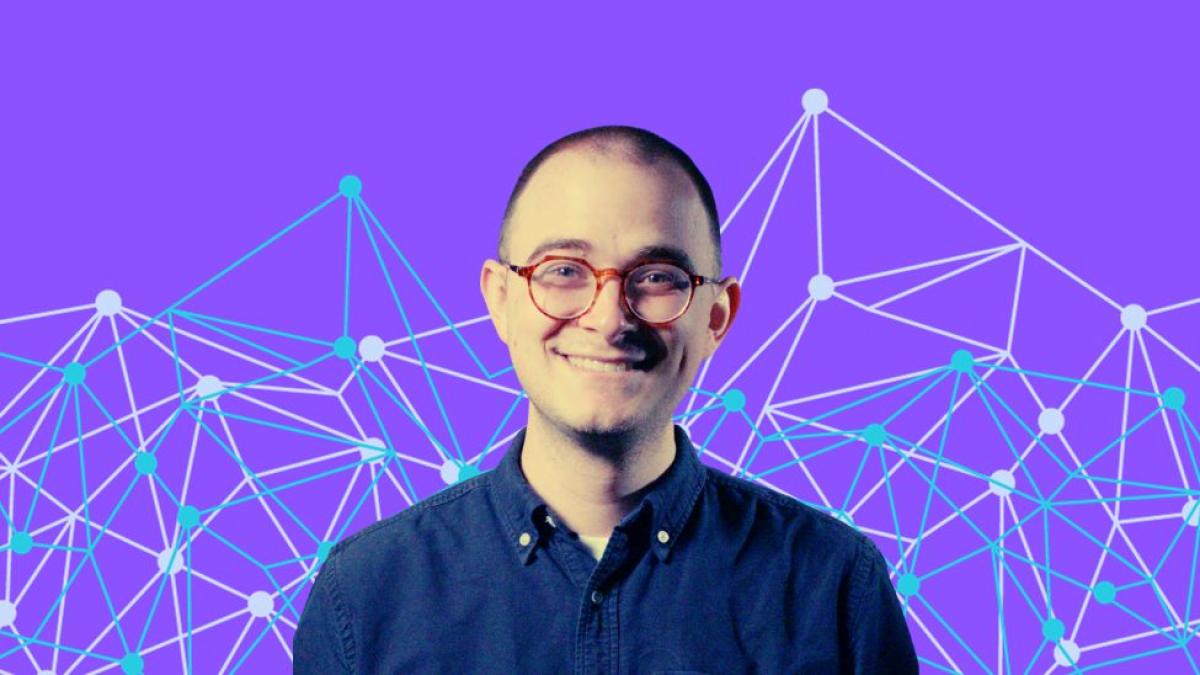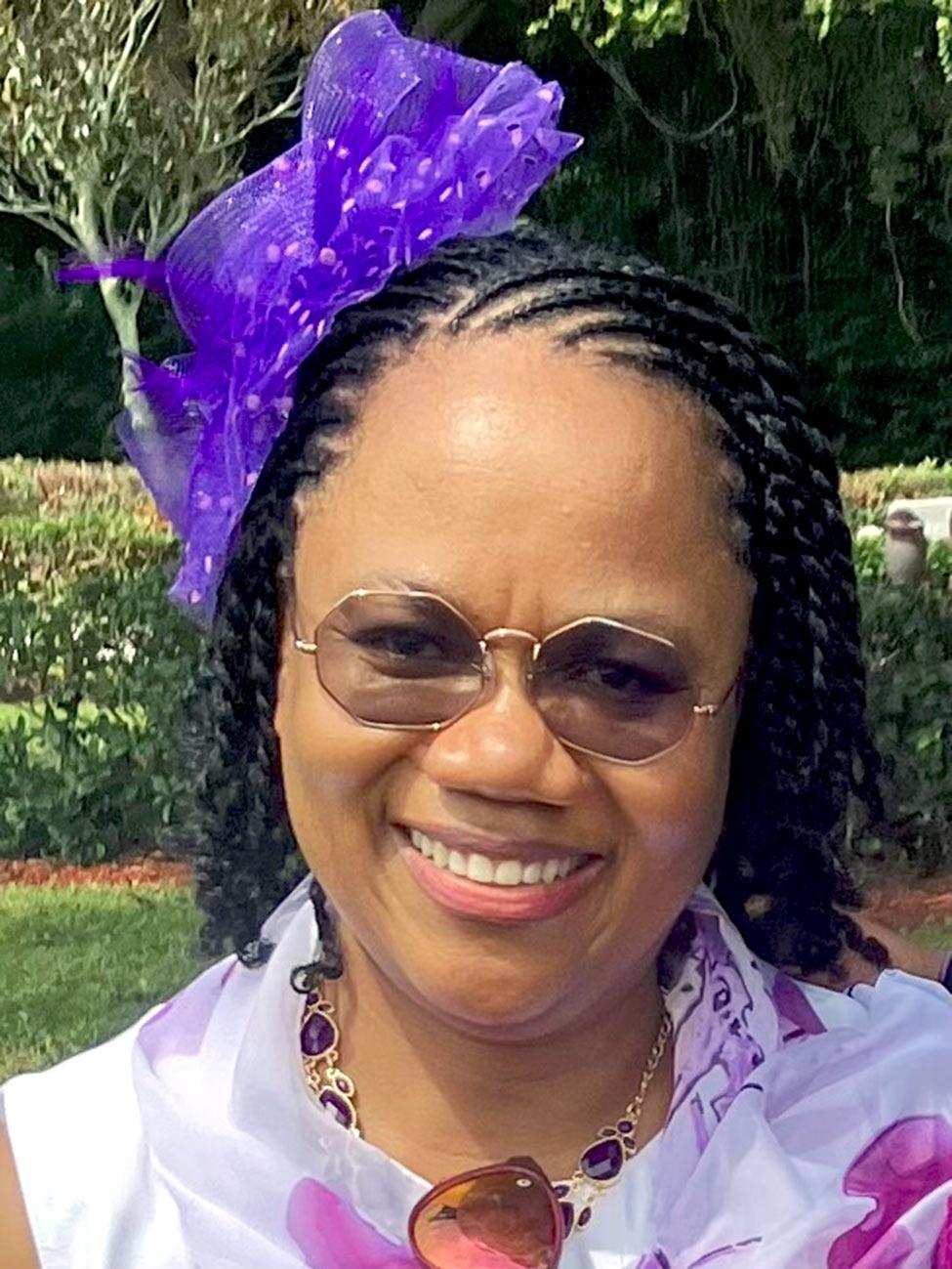
Expert: Trump's lawyers making "nonsensical arguments" in effort to evade Jan. 6 charges
Such arguments are “nonsensical,” Bennett Gershman, a former New York prosecutor and law professor at Pace University, told Salon. “Every person, including Trump, has the right to engage in ‘forceful political advocacy,’” he said. “But Trump and his co-conspirators went far beyond advocacy. Trump and his cohorts engaged in a criminal conspiracy to subvert the results of a lawful election by illegal means. To endorse this argument would be to sanction any action taken under the guise of political advocacy, including violence and even political assassination.”
Pace University’s Female Gamers Make Inroads in Male-Dominated Collegiate Esports
Pace University’s esports program is bucking a national trend in the growth of participation by female or non-binary athletes.
Reform US International Taxation Laws to Set a Global Example
Lubin Professor Philip G. Cohen pens an op-ed in Bloomberg Tax about reforming U.S. international taxation laws to set a global example.

The Physician-Author: A Q+A with Paulette Smart-Mackey ‘88
Jamaican-born alumna and physician builds on her foundation as a Dyson student by sharing her medical knowledge and instilling confidence as a children’s book author.
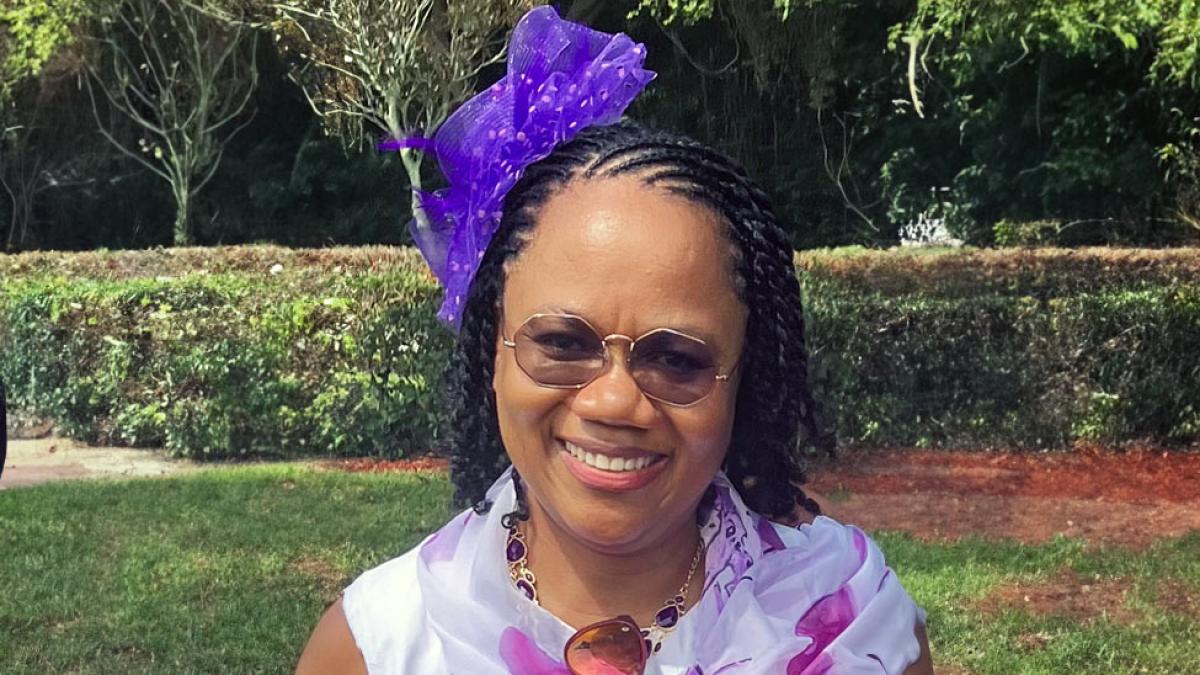

Paulette Smart-Mackey
Class of 1988
Bachelor of Science in Chemistry
Paulette Smart-Mackey is a physical medicine and rehabilitation physician, transformational coach, and mentor who is passionate about early learning. To this end, she has recently published a book, Meet Skulle, which helps children explore their natural curiosity for the science of the human body.
What inspired you to write this book and what do you hope your readers will gather from it?
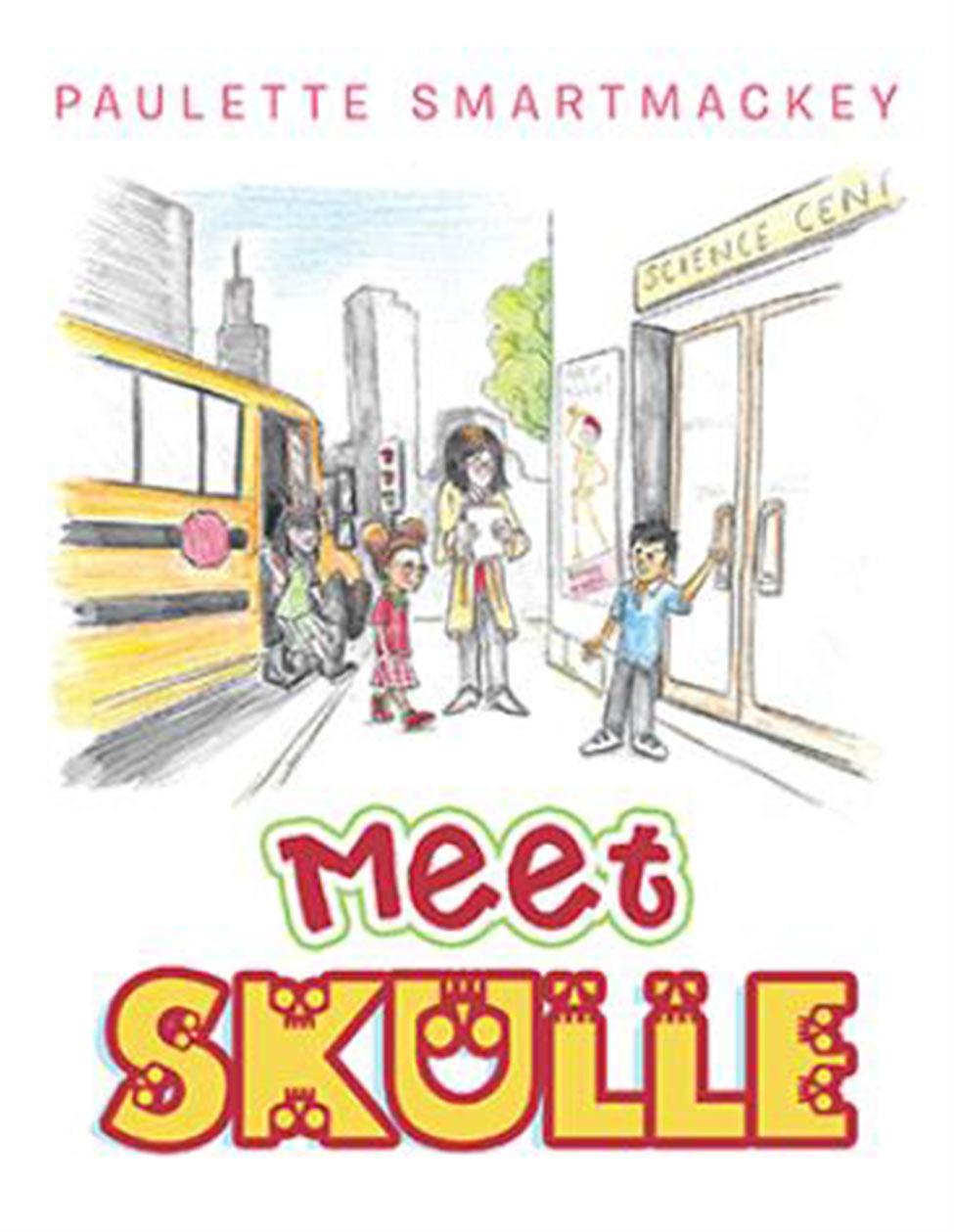
When my daughter was in elementary school, she was very curious about science and wanted to learn more about naming the bones in the human body. One day when she was in first grade, she asked me to come to school during a community session to teach her friends what she had already been learning. The administration allowed it, and it became an annual event which lasted through the fourth grade. When the pandemic occurred, my daughter inspired me to author Meet Skulle.
It is my hope that readers who are connected to a curious child will garner that learning complex topics can be accomplished at any age. My observations have been that, when children learn something new, their posture is more upright, and their eyes gleam. In them, I see the look of confidence in a future generation of leaders, and I wanted to share this “knowledge with confidence” theme with my readers.
Prior to attending medical school at The State University of New York at Buffalo, you earned a Bachelor of Science in Chemistry from the Pleasantville campus at Pace University. What attracted you to pursue a degree in chemistry? Did you always know you wanted to be a physician?
Pursuing a degree in chemistry came from the very analytical person within me who loves math and science, and chemistry seemed to combine these two passions. I knew I wanted to be a doctor from preschool age, and I confirmed my instincts by later volunteering and working in pharmacy stock rooms at area hospitals in order to be in the medical environment. I also engaged with disabled children in group homes and really enjoyed working and caring for people and being in the hospital community. I was inspired to specialize in physical medicine and rehabilitation by my medical school mentor and have found that caring for patients in a team setting, and addressing their medical, social, psychological, and physical needs, to name a few, is a thrill for me. Today, I use my medical platform to coach on health, wellness, and electrodiagnosis, and, recently, write this scientific book for youngsters.
Why did you choose to enroll at Pace?
My initial impulse was to enroll at Pace due to the close proximity to my home; however, as I was very focused on going to medical school, I was also excited to learn about the Dyson College of Arts and Sciences. I really enjoyed the curriculum, including the core courses and electives, which both prepared me for the medical school entry exam and provided a well-rounded exploration of other interests outside of the sciences, which is something that is a bit more difficult to do within the focused lens of medical school.
How have faculty been instrumental in your journey?
So many Dyson professors helped me collectively. My biology, chemistry, math, science, and science lab professors poured knowledge into me, pointed out my weaknesses, and helped me build confidence in the path I had chosen. My curriculum advisor helped to keep me focused. My history teacher demanded excellence in writing papers, which was a turning point for me, as writing and speech are fundamental in every profession. I realize now how each professor was helping me to build character with knowledge. Today, I use all of these skills both personally and professionally in my decision-making.
Each Dyson professor was helping me to build character with knowledge. Today, I use all of these skills both personally and professionally as a physician in my decision-making.
College is a significant time in a person’s life. In what ways did your time as a Dyson student influence you to become the person you are today?
When I was a student, I had only recently immigrated to the United States from Jamaica, so I was adapting to a new culture of learning, and I actually extended my time at Pace to learn more about socialization, integration, and community service, working both internally in the biology lab and externally at IBM and pharmaceutical company Ciba-Geigy. These experiences laid a solid foundation for me, and I took all the lessons learned with me in my training as a medical doctor and beyond.
Most of my challenges were cultural. With my Jamaican culture, I did not fully understand the journey of Black Americans in this country and the concept of racism and prejudice (in Jamaica, our motto is ‘out of many, one people’ and all are treated equally). So, integration was difficult for me, and it took me many years to fully understand my environment. These challenges, however, empowered me to pursue knowledge and to be the best version of myself. What I liked most about Dyson is that I felt at home there. It was a small community of students, professors, and staff with similar interests. This community helped me overcome some of the challenges.
Although a busy professional, you dedicate time volunteering for causes that are meaningful to you. Tell us more about that.
As someone who has been invested in by others, I believe in giving back and returning the favor. Most of my time volunteering was spent at local schools, churches, and church organizations, and my most memorable was as a Dyson student volunteering with the Big Brothers Big Sisters organization. For me, volunteering was a nice break from classes and seeing the joy on people’s faces when you invest time with them energizes my heart in a powerful way.
What advice would you give to our students as they navigate their college life?
As you climb the ladder to greater heights, what brings the most content at the top is the depth of your character. Consider bringing along an attitude of gratitude on your journey and have fun along the way.
Pace University to Kick-Off Social Justice Week on October 29
Pace University on Sunday, October 29 will kick-off its annual Social Justice Week across its three campuses – in lower Manhattan, Pleasantville, and White Plains. In its fourth year, the week features events that adhere to values of equity and justice while engaging the campus community in learning activities and dialogue centered on the issues of social justice.
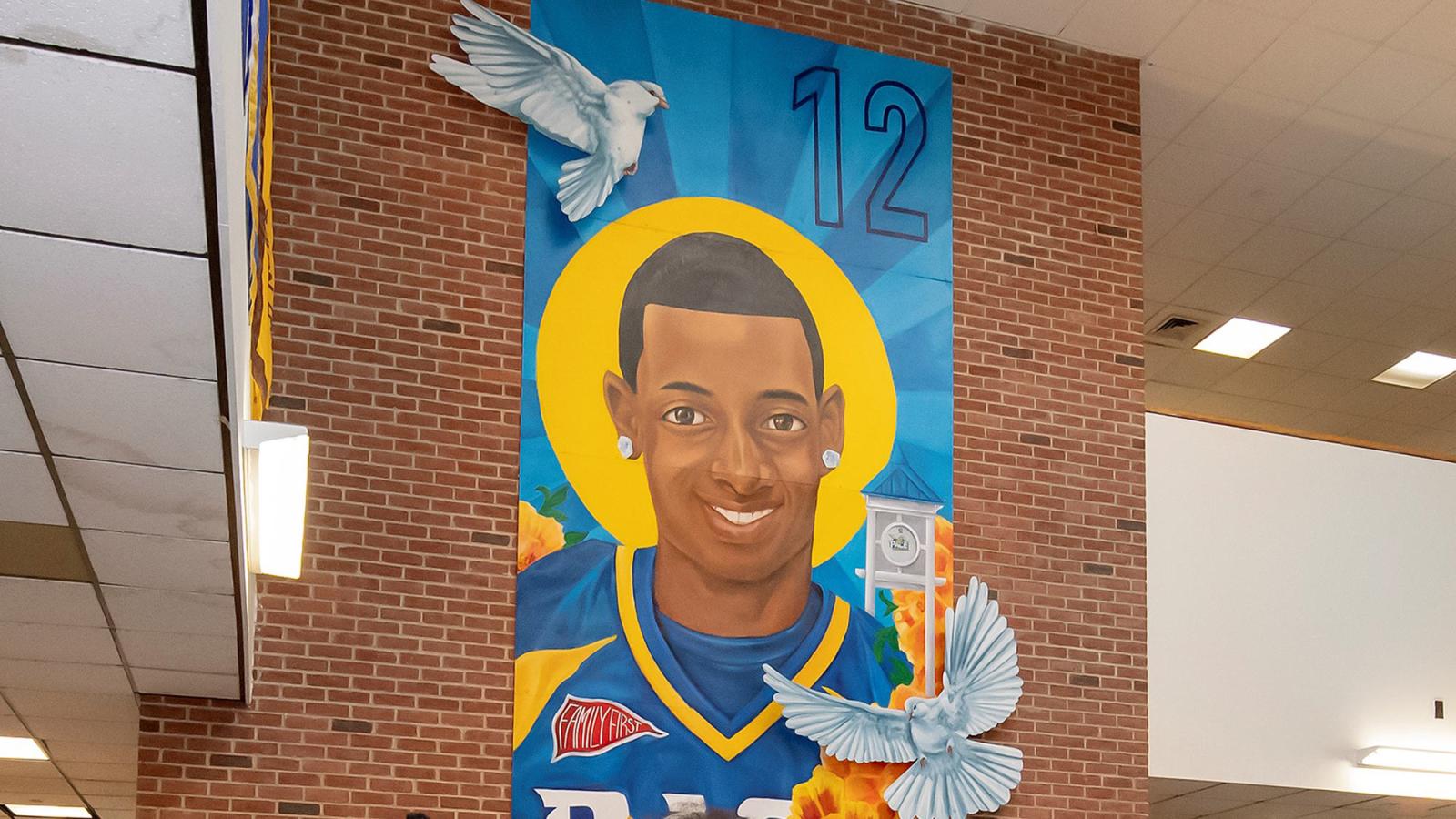
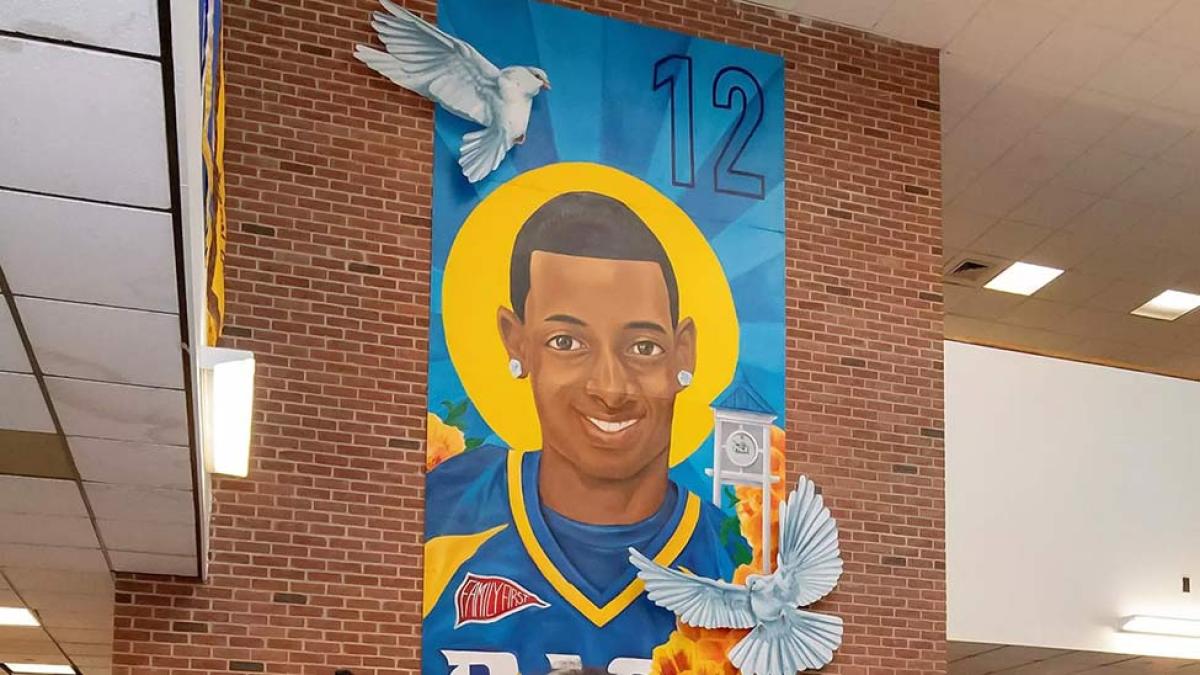
Westchester County District Attorney Miriam E. Rocah will be one of the featured guest speakers participating in Social Justice Week
Pace University on Sunday, October 29 will kick-off its annual Social Justice Week across its three campuses – in lower Manhattan, Pleasantville, and White Plains. In its fourth year, the week features events that adhere to values of equity and justice while engaging the campus community in learning activities and dialogue centered on the issues of social justice.
During the summer of 2020, Pace alumni, students, staff, and faculty, in consultation with the Henry family, conceptualized Social Justice Week to honor DJ’s life and acknowledge the connections between his story, racial injustice, and other examples around the country. DJ was a student on Pace’s Pleasantville Campus and a member of the football team. On October 17, 2010, Pace's Homecoming weekend, DJ was shot and killed by a Pleasantville police officer.
"We at Pace are committed to upholding the legacy of DJ Henry and advancing the cause of social and racial justice," said Pace President Marvin Krislov. "Social Justice Week is our opportunity each year to introduce a new generation of students to DJ’s story, and to encourage open dialogue and proactive steps within our community for positive change.”
DJ's family founded the DJ Henry Dream Fund to carry on his legacy and passion for youth sports. To learn more about DJ, visit the DJ Henry Dream Fund, view this video from the DJ Henry Dream Fund, view this video from CBS News, or read this social media post.
Held to coincide with DJ’s birthday, October 29, Social Justice Week is a community-driven effort that understands that DJ’s story cannot be told accurately without acknowledging how it is connected to the history and present-day reality of racism, inequity, and injustice. The week aims to create brave spaces that challenge forms of oppression, and to create a starting point from which meaningful dialogue and action can be fostered for the entire Pace Community.
The week will kick-off with a digital memorial of DJ Henry on all three of its campuses. Curated by the Pace Community and the Henry family, the images displayed were selected to illustrate the life and lasting impact of DJ’s life and death. Throughout the week, there will also be original programming of more than 40 events focusing on a broad range of topics.
On Thursday, Nov. 2, at The Elisabeth Haub School of Law, a discussion will be held by Westchester County District Attorney Miriam E. Rocah and a panel of experts. The discussion will focus on the conclusion to the independent reviews of the police-involved shooting deaths of DJ Henry and Kenneth Chamberlain, Jr.
"Social Justice Week is a special tradition that is unique to Pace University,” said Jeff Barnett, Ph.D., vice president for student affairs and dean for students. "It epitomizes and reinforces our commitment to the institutional values of centering the student experience and becoming an antiracist university. Social Justice Week helps foster education and advocacy for our students, faculty and staff, and the greater community."
Additional events during Social Justice Week include discussions on social justice for women in sports, a presentation of CBS 48 Hours "Defending DJ," which delves into the circumstances surrounding DJ Henry's death; a reading of literary works by student writers from the Writing for Diversity and Equity in Theater and Media program; an overview of the 51+ year history of Title IX; a walking tour exploring the history of slavery and resistance; a conversation addressing the issue of food insecurity, and a presentation that highlights the impact of unconscious white socialization on classroom decisions, particularly those affecting students of color.
A full schedule of events is available.
Director of Residential Life at Pace University in Pleasantville and Dyson Adjunct Professor Vinnie Birkenmeyer recently published an op-ed in The Journal News calling on state and county lawmakers to propose legislation — DJ’s Law — requiring specific training for law enforcement about best practices in different moving vehicle situations. At the time of DJ’s death, Birkenmeyer was a senior at Pace University and was serving as the president of the Student Government Association.
“I still count it as one the most pivotal moments in my life, and a large part of why I went into working in student affairs on college campuses — seeing the impact decisions made during tragedies can have on young adults and wanting be part of that support network,” Birkenmeyer wrote in his op-ed. “In the last 13 years I have been proud of the work done to keep DJ’s memory alive at Pace through the dedication of permanent structures to honor DJ on our Westchester and New York City campuses, telling DJ’s story in various venues, and most notably through the adoption of the annual DJ Henry Social Justice Week.”
“Pace University is committed to providing transformative experiences for our diverse student body, and our students display remarkable passion for diversity, equity, and inclusion,” said Stephanie Akunvabey, Ed.D., chief diversity officer at Pace University. "I admire the initiatives undertaken by the Pace Community during Social Justice Week and eagerly look forward to actively listening, engaging, and learning from the diverse array of events.”
About Pace University
Since 1906, Pace University has been transforming the lives of its diverse students—academically, professionally, and socioeconomically. With campuses in New York City and Westchester County, Pace offers bachelor, master, and doctoral degree programs to 13,600 students in its College of Health Professions, Dyson College of Arts and Sciences, Elisabeth Haub School of Law, Lubin School of Business, Sands College of Performing Arts, School of Education, and Seidenberg School of Computer Science and Information Systems.
From engineering to empathy: a journey into UX research
Nishant Doshi moved from India to New York to make the most of the opportunities Pace has to offer—and he’s succeeding.
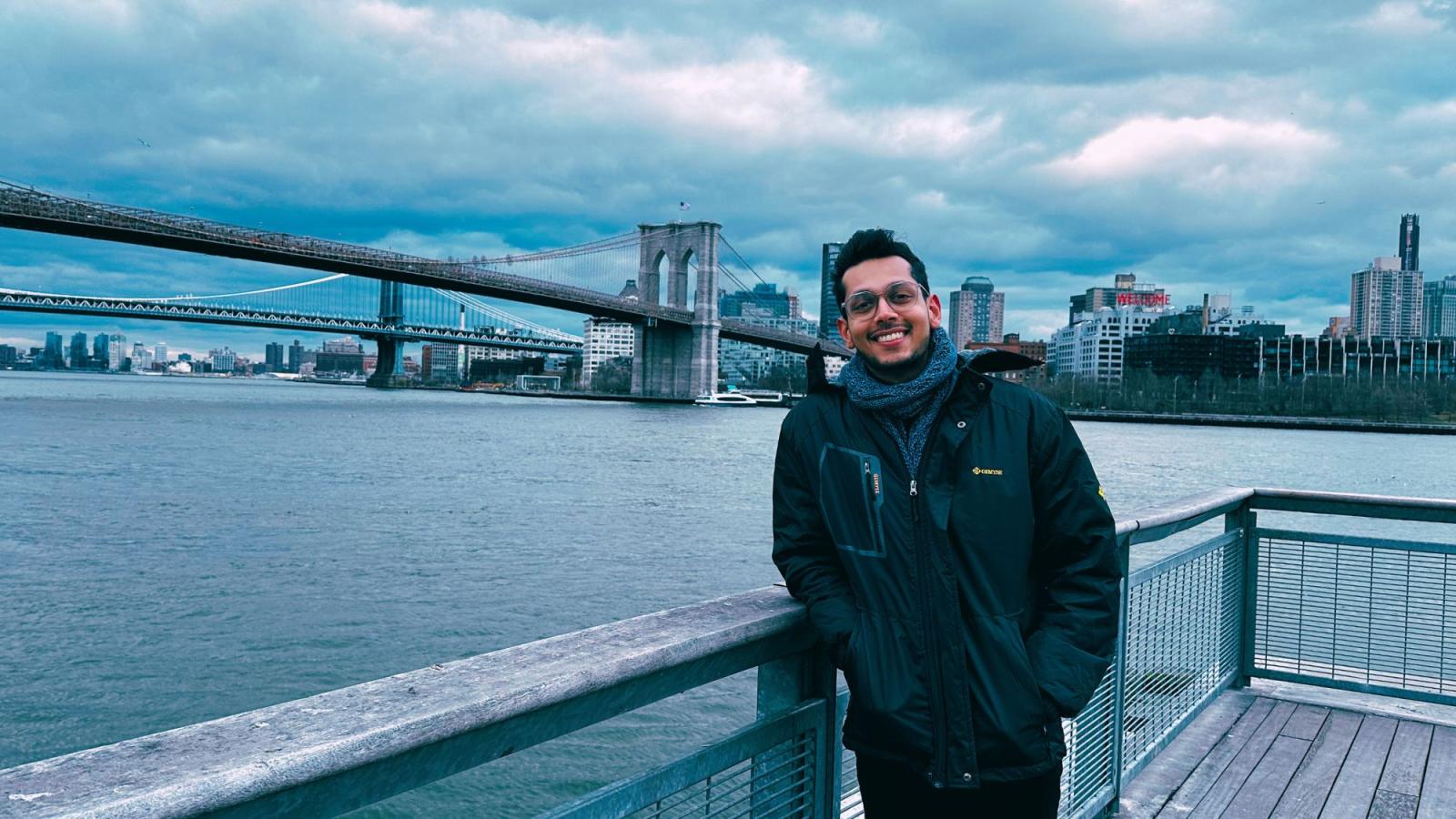
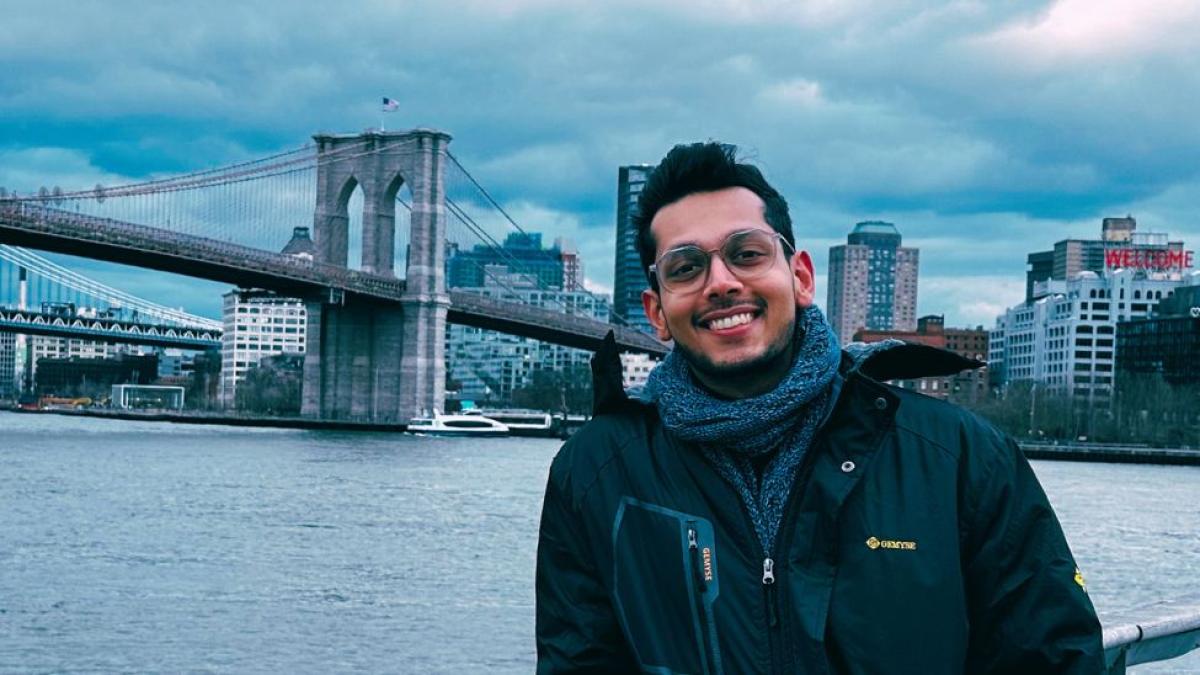
Nishant Doshi moved from India to New York to make the most of the opportunities Pace has to offer—and he’s succeeding.
We caught up with Nishant for a few questions to learn all about his adventures in UX research, the many projects he’s part of, and his advice for students considering human-centered design.
What brought you to Pace University?
During my undergraduate studies in computer engineering in India, I discovered a passion for graphic design while volunteering at a professional society. This experience sparked my interest in the intersection of technology and design, leading me to explore career opportunities in this domain. My journey led me to Pace University's MS in Human-Centered Design (HCD) program, where the curriculum aligned perfectly with my vision. Plus, the opportunity to study at the NYC downtown campus was impossible to resist! The location is very scenic, as stepping out you see the World Trade Center, which is a remarkable sight at night. My favorite spot in the city, pier 17, is also just a 10-minute walk away, which has a view of the Brooklyn Bridge that never gets boring!
What are some noteworthy projects you've worked on at Pace?
My academic journey at Pace University has afforded me the privilege of collaborating on a diverse range of projects with exceptionally talented peers and experienced faculty. One standout project was the "Access to Justice" project during the Research Methods for UX class, led by Professor Andreea Cotoranu. This multidisciplinary project spanned four months and involved regular collaborations with students from the Elisabeth Haub School of Law. It was both challenging and fulfilling, introducing me to teamwork across diverse backgrounds. Additionally, I had the opportunity to conduct remote user interviews to evaluate the usability of the Uber Eats app in a Human Factors & Usability Evaluation class under Professor Tony Wang.
The next project I'm embarking on is undoubtedly one of the most intriguing, thrilling, and intense endeavors of my academic journey. Under the NYC Design Factory, a select group of my peers and I have been chosen to participate in . . . a two week trip to Geneva, Switzerland, where we will work at CERN Ideasquare . . .
What have been your favorite classes so far, and what were they about?
One of my favorite classes to date has been Information Architecture, taught by Professor Lis Hubert. This course introduced me to the critical concept of structuring websites and applications with a focus on Users, Content, and Context. Our semester-long project involved evaluating the information architecture of Manduka.com, an e-commerce website specializing in yoga apparel and accessories. We conducted card sorts and tree tests to assess the website's effectiveness. The course was so enriching that many of us wished it were a core requirement rather than an elective.
Could you tell us about your role at the NYC Design Factory?
I'm incredibly fortunate to have been offered the role by Professor Cotoranu. As a Student Assistant, my responsibilities include planning and organizing design thinking workshops and activities, introducing the design thinking process to individuals new to the concept. I have the privilege of working in the newly constructed Seidenberg Design Factory Lounge, my favorite spot on campus (9th floor at 15 Beekman—ed). I'm also responsible for promoting the activities and events organized by the NYC Design Factory on social media. I'm excited about this opportunity and the chance to make a meaningful contribution.
What are your career aspirations upon graduating?
Upon graduating, I aspire to pursue a career as a UX researcher, which aligns with my ideal career path. I'm eager to work with outstanding companies and apply my knowledge to impactful, real-world projects. My strong interest in social work, which is rooted in the values of empathy, plays a significant role in my journey. These values were instilled in me from a young age, thanks to my family, and have greatly contributed to my development. It's worth noting that this strong foundation in empathy led to me being elected as the president of an international youth organization. I hope to contribute meaningfully to society in any way possible.
Tell us about the opportunities you've had at Pace
Pace University has consistently given me and my classmates many opportunities since the program started. One remarkable experience was my participation in a four-day design thinking virtual hackathon organized by Shenkar University of Art, Design, and Engineering in Israel through the NYC Design Factory. Working with people from diverse cultures and professional backgrounds, we ideated a solution for Monday.com, our client for the hackathon. This was the first project that allowed me to apply my academic knowledge to a non-academic context, resulting in an innovative extension to Monday.com's dashboard that utilizes AI, satellite imagery, and social media to aid first responders during disaster rescue missions by sourcing information from X (formerly Twitter) data. I've also had the privilege of interning at a tech startup in Chicago during summer of 2023, where I could apply my UX research and design skills to a real product. One memorable moment was when the CEO mentioned that students from the HCD program at Pace University that he had interviewed for the role stood out due to the experience and skills they portrayed. This is a testament to the quality of education at Pace University!
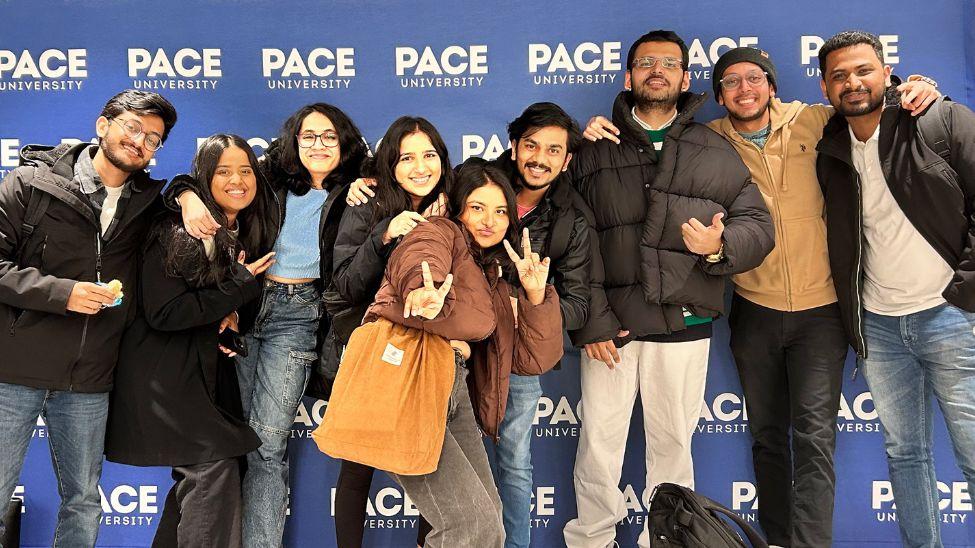
What's next for you?
The next project I'm embarking on is undoubtedly one of the most intriguing, thrilling, and intense endeavors of my academic journey. Under the NYC Design Factory, a select group of my peers and I have been chosen to participate in the Challenge-Based Innovation A3 project. This project involves a two-week trip to Geneva, Switzerland, where we will work at CERN Ideasquare, located within the CERN campus. This intensive two weeks marks the beginning of a seven-month-long project under the Product Development course, led by Professors Andreea Cotoranu and Luke Cantarella. Our objective is to leverage CERN and Attract's big data and deep technology to design solutions in alignment with the United Nations Sustainable Development Goal 12: Responsible Consumption and Production. I am incredibly excited about this opportunity and look forward to sharing more as the project unfolds. Track the journey of Team Oculus, of which I am a part, as we ideate solutions for the years 2030, 2035, and beyond.
Any advice for other students?
My advice for fellow students considering this program is to always remain open to conversations, as they are the breeding ground for fresh ideas. Do not shy away from asking questions; curiosity is a cornerstone of design thinking as it fosters creativity and ideation. Finally, practice empathy. Seek help when you need it and offer your assistance to others in their times of need. This approach has allowed me to establish meaningful connections and cultivate a network of talented friends.
Anything else you'd like to add?
When I am not busy with work, you could find me reading UX articles (Yes, I do that for fun!) or strumming to classic rock ballads from the 80s on my guitar! I am also a big football (Soccer) fan, and I never miss an FC Barcelona match! If you'd like to follow my UX journey, please visit my portfolio.
Meet Stephanie Akunvabey, EdD, Chief Diversity Officer, Associate VP of Diversity, Equity, and Inclusion
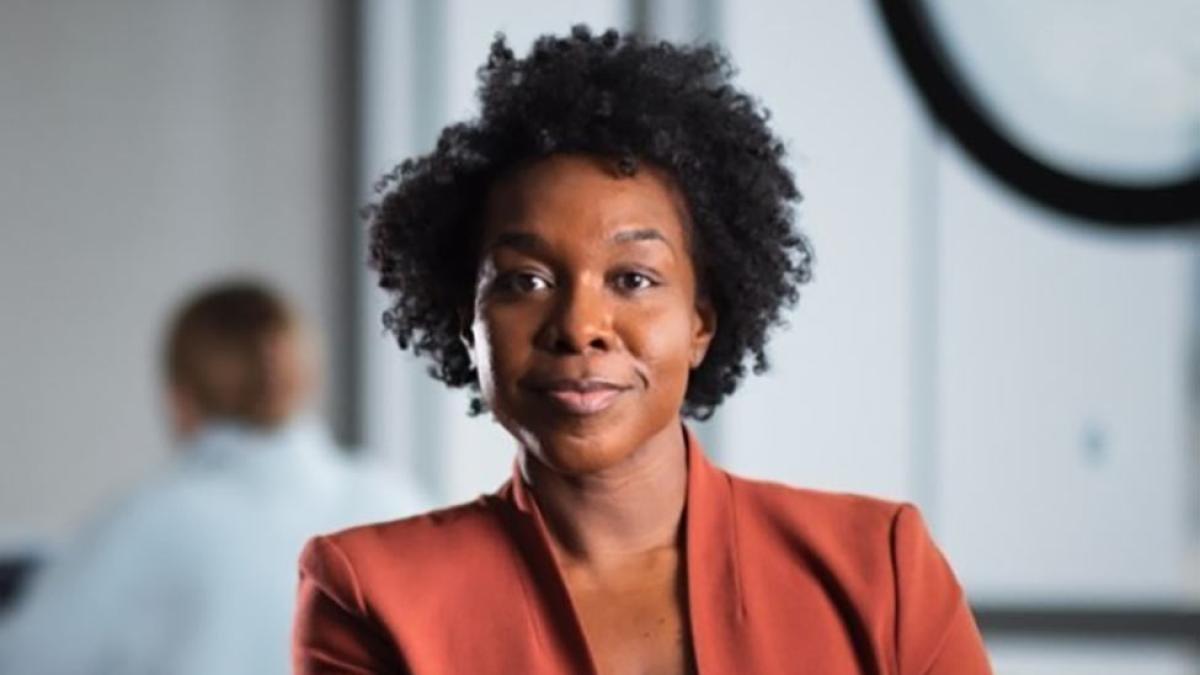
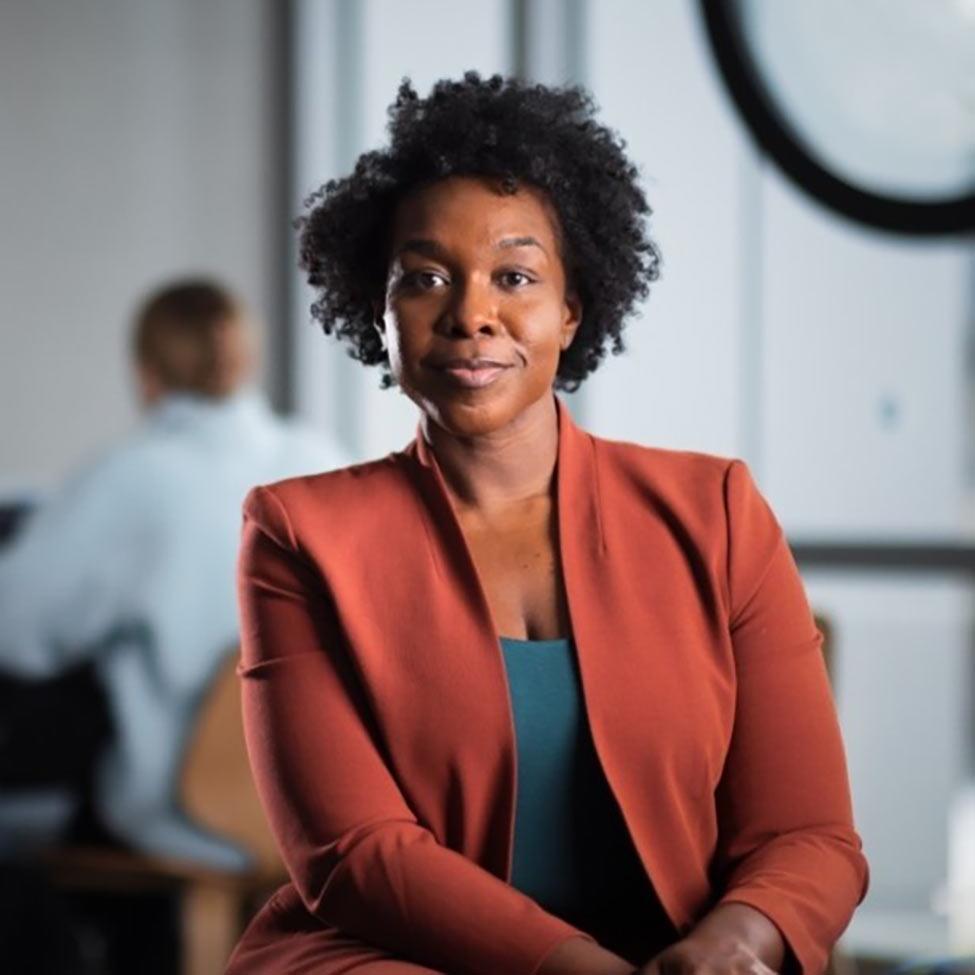
What attracted you to Pace?
Location. Location. Location. I was thrilled to return to the New York area, and to join an institution with such a clear mission - “Opportunitas". The NYC, Pleasantville and White Plains campuses offer a wide variety of possibilities for students to pursue their passions. After meeting with Pace faculty and staff, it was clear that Pace would be a great place to leverage my talents and learn from great colleagues.
What impact do you hope to make on the Pace community?
As CDO one of my primary goals is to help Pace fulfill its strategic priority of becoming an Anti-racist institution. It isn’t something I can do on my own, but I believe I can help build the infrastructure that makes it possible. There are amazing faculty, staff and passionate students who have already committed to advancing key social justice initiatives at our institution. I look forward to partnering with long-standing equity champions and inviting others to join the effort.
Is there a book that has had a meaningful influence on you, personally and/or professionally?
I love books. In terms of personal influence, it’s impossible to choose just one. Professionally I've drawn lots of inspiration from Immunity to Change: How to Overcome It and Unlock the Potential in Yourself and Your Organization by Lisa Laskow Lahey and Robert Kegan.
Do you have a favorite quote that you would like to share?
"Think Big. If that doesn't work, think bigger."
What do you enjoy doing in your free time to relax?
Music is my happy place. I love an impromptu kitchen dance party with my family. I also enjoy going for long walks while listening to audio books or some of my favorite tunes.
What would be your ultimate getaway vacation destination?
Anywhere with good vibes, sun, fresh fruit, and the sounds of the ocean.
Do you prefer sweet or savory for your snacks?
I've always had a sweet tooth. But lately, I've really come to appreciate a blend between sweet and savory. Chocolate covered pretzel is the way to go.
If there is anything else you would like to share with the Pace Community?
The DEI division will be offering lots of opportunities to learn and engage. One example is our upcoming Safe Zone: LGBTQ+ Allyship Training on Friday, November 3rd at 11am. Register for the Zoom training. I hope to see you there!
Description of workshop: This virtual workshop will explore concepts such as sexuality, gender identity, and assigned sex at birth while providing guidance for creating safe(r) spaces on a university’s campus through an intersectional and anti-racist lens. This workshop welcomes folks with little to no background knowledge of LGBTQIA+ identities and topics while aiming to challenge those who are confident with their prior knowledge with new ideas and perspectives. Participants will also have the opportunity to participate in a follow-up (level 2) session that will take place later this fall.
Compare Personal Loan Rates
Lubin Professor Larry Chiagouris speaks with WalletHub about comparing personal loan rates.

Enabling Greater Success for Autistic Students
Seidenberg professor James Lawler was awarded Best Conference Paper and Best Paper of the Innovative Education, Pedagogy and Teaching Track for "A Case Study for Enabling Autistic Students to Enter Best-of-Class Career Programs in Science, Technology, Engineering and Mathematics (STEM)", at the 59th Annual Meeting of the Institute for Operations Research and Management Science.
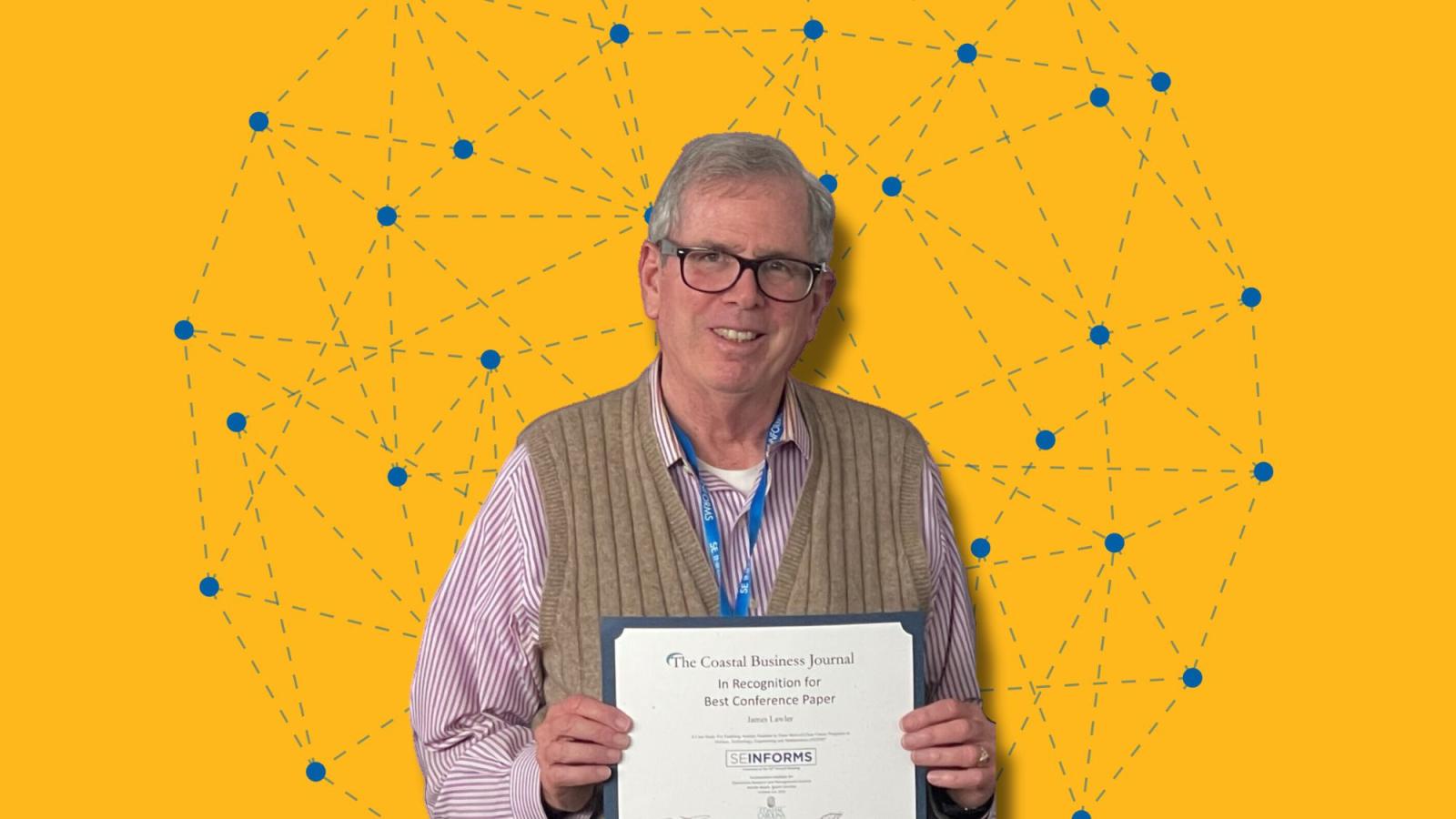
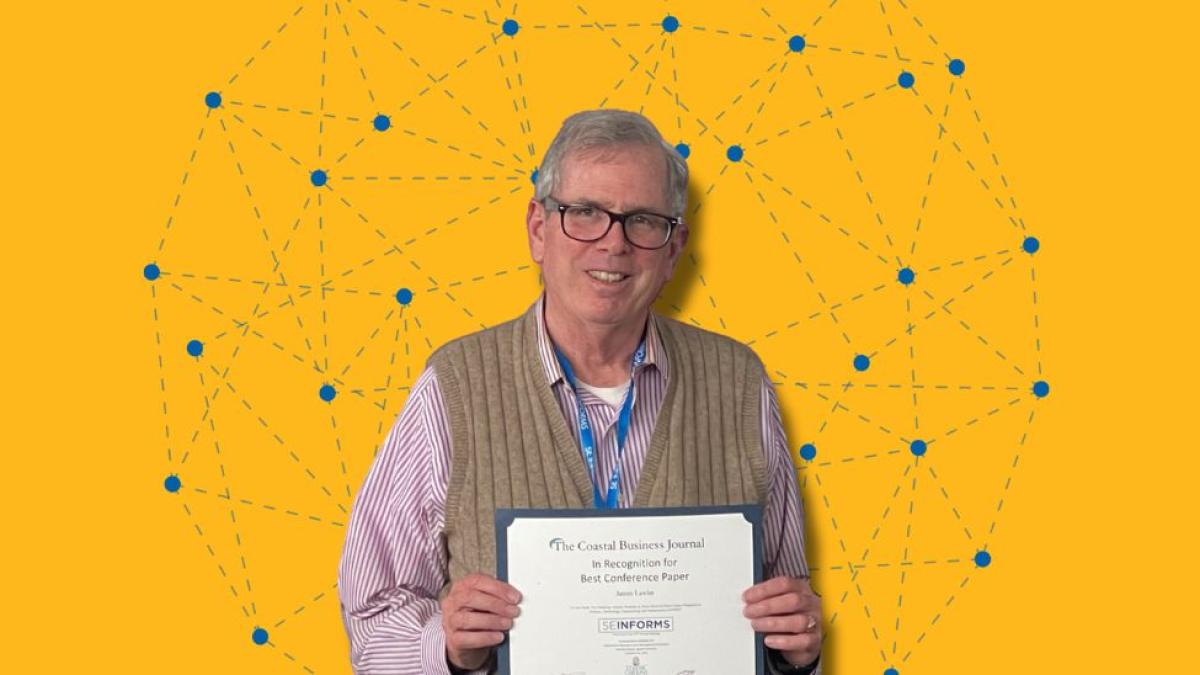
Seidenberg professor James Lawler was awarded Best Conference Paper and Best Paper of the Innovative Education, Pedagogy and Teaching Track for "A Case Study for Enabling Autistic Students to Enter Best-of-Class Career Programs in Science, Technology, Engineering and Mathematics (STEM)", at the 59th Annual Meeting of the Institute for Operations Research and Management Science (INFORMS), in Myrtle Beach, South Carolina, on October 4-6.
The research entailed exploring how, despite a higher rate of inclusion of autistic students in post-secondary schools, the programs into which they are entering may not be enabling the students effectively. While the programs may be academically appropriate, only 34% of students with disabilities enter these programs, and of those, only 39% graduate. The statistics continue to decline further along the students' path—with only 15% of graduating students estimated to be employed in the five years following graduation.
Dr. Lawler proposed that autistic students can be better enabled for success and designed a model to support solutions beyond typical services.
The model includes focus on five constructs: accommodation for curricular in STEM, curricular focus in STEM, extra-curricular growth, health and mentoring services, and opportunities and recognitions. Each area includes a wealth of programmatic and support recommendations to improve the experience for students with autism in STEM programs.
Dr. Lawler has a longstanding history of research and project-based activity related to people with disabilities. He has created several programs and projects at Pace that focus on building better experiences for students. "Most of the Pace students engaging in the programs and projects are students without disabilities learning about those disadvantaged and with disabilities for the first time," he said.
"Programs are also engaging Pace undergraduate students in participating on projects with me with the Mayor's Office for People with Disabilities (MOPD) of the City of New York, such as the Disability Film Festivals that we do at the university. We are fortunate moreover to be partnering with OASIS at Pace University and with Tech Kids Unlimited as we pursue new programs and projects in the fields of diversity and technology at the university."
The conference paper was also awarded competitively for funding by the Helene and Grant Wilson Center for Social Entrepreneurship of the university in 2022.
Additionally, the 10th Anniversary Celebration of People with Disabilities in Films Disability Film Festival at Pace University will be Wednesday, April 10, 2024.
More from Pace
Nishant Doshi moved from India to New York to make the most of the opportunities Pace has to offer—and he’s succeeding.
Do you have an innovative solution that can make a positive impact on the environment? Share your ideas by December 19 for the chance to win a $15,000 grant! Join The Front Yard at Pace University and Speedemissions in addressing climate change, protecting the planet, and slowing threats to Earth's ecosystem.
Seidenberg's new faculty member, Jonathan Williams, brings his expertise to the human centered design master's program, where user experience leads technologists, artists, designers, and psychologists to build better, more equitable, and more beautiful things.
Professor Sam Kalen Examines the Future of the Administrative State During Gilbert and Sarah Kerlin Lecture on Environmental Law at Elisabeth Haub School of Law
On Tuesday, October 3, 2023, Sam Kalen delivered the annual Gilbert and Sarah Kerlin Lecture on Environmental Law. Professor Kalen is the William T. Schwartz Distinguished Professor of Law and Associate Dean at the University of Wyoming College of Law, as well as the founder and co-director of the School’s Center for Law and Energy Resources in the Rockies. Also, he is currently the Visiting McKinney Family Chair in Environmental Law at IU McKinney School of Law. The topic of his lecture was “The Supreme Court’s Approach Toward the Administrative State and Implications for Environmental Programs.”
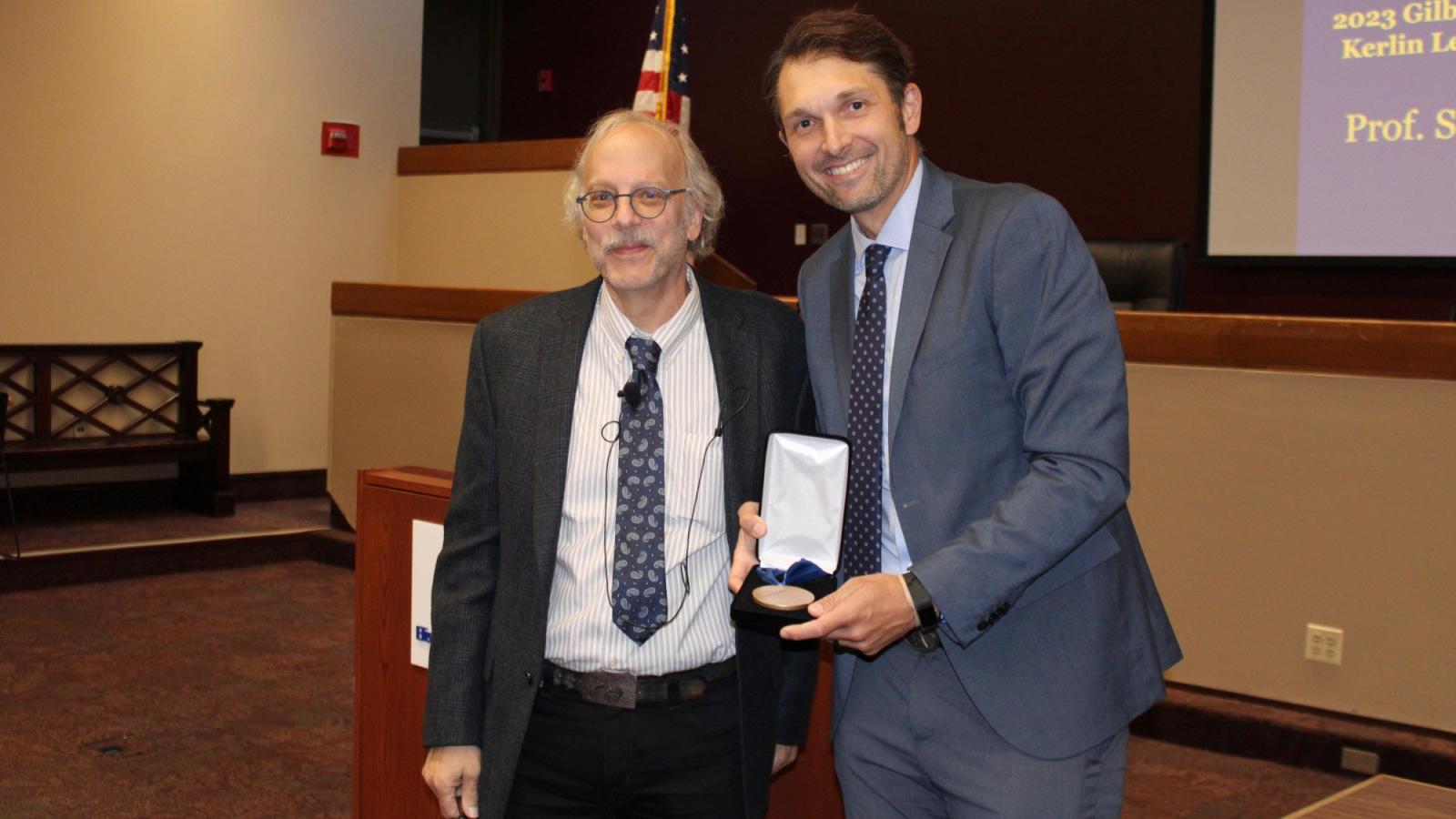
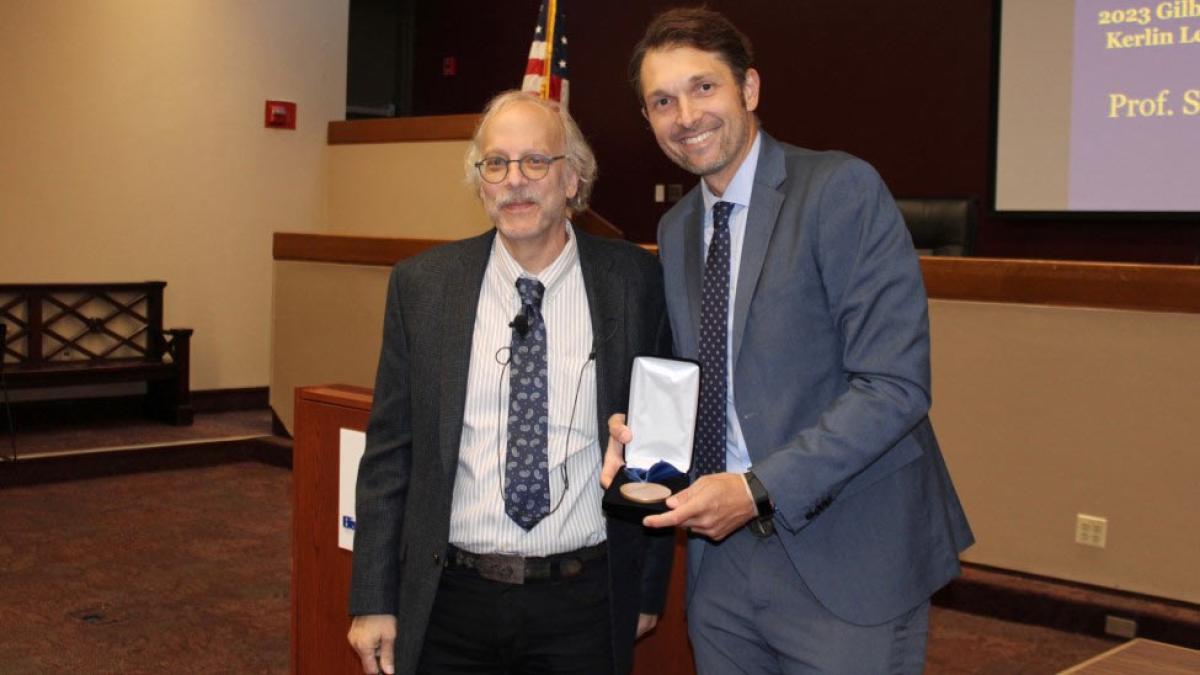
On Tuesday, October 3, 2023, Sam Kalen delivered the annual Gilbert and Sarah Kerlin Lecture on Environmental Law. Professor Kalen is the William T. Schwartz Distinguished Professor of Law and Associate Dean at the University of Wyoming College of Law, as well as the founder and co-director of the School’s Center for Law and Energy Resources in the Rockies. Also, he is currently the Visiting McKinney Family Chair in Environmental Law at IU McKinney School of Law. The topic of his lecture was “The Supreme Court’s Approach Toward the Administrative State and Implications for Environmental Programs.”
Prior to the commencement of the lecture, Jason Czarnezki, Gilbert and Sarah Kerlin Distinguished Professor of Environmental Law and Associate Dean of Environmental Law Programs and Strategic Initiatives thanked all who helped to make this year’s Kerlin lecture happen and introduced the Dean of the Elisabeth Haub School of Law at Pace University, Horace E. Anderson Jr. Dean Anderson spoke of the importance of the Kerlin lecture and the innovative and premiere environmental legal education that Haub Law provides, which includes hosting speakers like Professor Sam Kalen. Dean Anderson noted, “We are consistently honored to host top scholars, dignitaries, attorneys, experts, and leaders in public service, such as Professor Kalen, to speak to our community about current environmental challenges and importantly, solutions to those challenges. This knowledge is fundamental to our understanding of how we apply the rule of law to impact not just us as individual humans, but also our planet.” Professor Jason Czarnezki formally introduced Professor Sam Kalen, in presenting the 2023 Gilbert and Sarah Kerlin Lecture Award, highlighted Professor Kalen’s impressive background and career, including serving in the Solicitor’s Office at the Department of the Interior during the Clinton administration.
Professor Kalen started his lecture by noting that it was fitting to have a lecture about the Supreme Court as the Court’s term just started. In particular, a discussion about how the judiciary is deciding cases, and how those decisions may implicate environmental cases and laws moving forward was warranted given that there are at least three cases set to go before the Supreme Court this year that seek to curb the power of federal agencies.
Throughout the lecture, Professor Kalen shared his concern for the future of the environmental administrative state. “Some of what I may say can be considered depressing for those that cherish our environmental programs,” said Professor Kalen. A focus of Professor Kalen’s lecture was detailing specific environmental law cases, both historical, and more recent, and how the Court at the time approached the administrative state and looking towards the present cases before the Court and future.
Professor Kalen went on to note that the recent case, Sackett v. EPA, is one of the most momentous decisions issued by the Supreme Court narrowing the scope of the Clean Water Act. In this case, the Court considered whether the 9th circuit applied the appropriate test to determine whether Sackett’s property contained wetlands that are “adjacent wetlands” as regulated by the Clean Water Act. While the case deals with the Clean Water Act, he notes, it reduces related environmental rights and the scope of agencies. “Sackett also does something else,” he notes. “It illustrates the Court’s approach towards the administrative state and suggests a greater involvement by the judiciary shifting more power to the courts when interpreting statutes and for our purposes, environmental statutory law.”
“Environmental programs function as a consequence of how the modern administrative state operates,” he said. “Agencies need flexibility to address new and emerging environmental threats and concerns.” Of primary concern, Professor Kalen notes, is that through cases like Sackett, the Supreme Court has employed methods to chip away at the modern administrative state. Professor Kalen’s lecture detailed that recent cases brought before the courts involve three things regarding administrative agencies (1) agency structure; (2) agency authority and flexibility; and (3) the malleability of modern statutory construction.
Professor Kalen concluded his lively lecture, by nothing that what a case like Sackett has done is “basically give the power over to the judiciary to interpret language and not give deference to agencies and, the minute it does that, it hinders agencies ability to move forward in a progressive way.”
After the lecture, audience members had an opportunity to comment and ask questions. The impactful, provocative, and honest discussion continued. In response to an audience question regarding what we can do to move forward in a positive manner, Professor Kalen honestly answered that he does believe we are in trouble. “I think right now the courts are outcome driven. Regardless of how the language is drafted, what we are seeing is judicial opinions doing very strange things from a statutory construction perspective. I wish I could say otherwise or that these are principled decisions, but I think it is difficult for some of us to say that they are in fact principled decisions.” Following the lecture, a networking reception was held where the Elisabeth Haub School of Law at Pace University community had the opportunity to the continue the conversation with Professor Kalen and one another.
The Elisabeth Haub School of Law established the Gilbert and Sarah Kerlin Lecture on Environmental Law to expand its programs of research, education, professional and scholarly activity and publications in environmental law, a field for which the law school has received national and international recognition. The Kerlin endowment funds a named professorship on Environmental Law at Haub Law. Professor Nicholas A. Robinson, founder of the Haub School's environmental programs, was named the first Gilbert and Sarah Kerlin Distinguished Professor in 1999 and Professor Jason J. Czarnezki was designated as the second Kerlin Distinguished Professor in 2013. The last Kerlin lecture was given by U.S. Environmental Protection Agency General Counsel Jeffrey Prieto.

